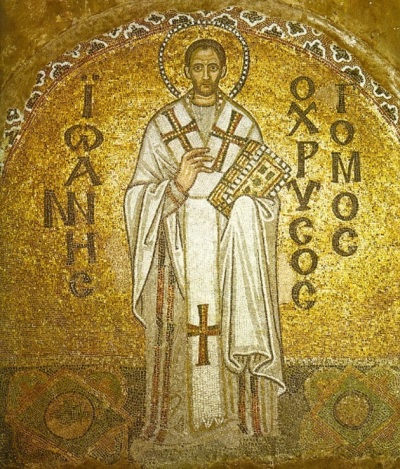Why preaching is central to priesthood

Years ago, when teaching at a seminary, I was responsible for the course on the ancient church. In every class I have ever taught, I have regarded it as my chief task to introduce students to the great primary texts on the subject at hand; in this course, I made sure that they became acquainted with John Chrysostom’s On the Priesthood. Of course, any book with the word “priesthood” in the title was not an obvious choice for the Presbyterians who generally populated my classes, but it was nonetheless a text that proved popular and, if emails from graduates are any basis for judgment, useful to those who went on to ordained ministry.
Orthodox and Catholics may be surprised by that. Chrysostom's conception of the ministry is, after all, highly sacramental, with baptism and the eucharist at its heart. But it is not just the sacraments that are at the heart of Chrysostom’s understanding of ministry. As his nickname indicates, he was an outstanding preacher. On the Priesthood demonstrates that the proclamation of the Word was a vital part of his conception of the ministry.
His chapter on the ministry of the Word is, perhaps unintentionally, one of the most amusing. In a section on how to handle responses to sermons, he advises preachers to pay no attention to criticism from laypeople as, untrained as they are, they are incompetent to offer such. The sting in the tale, of course, is that the same principle applies to praise. The admirer is no more competent than the critic; and just as criticism should not cause the preacher to be despondent, so praise should not tempt him to pride.
Amusing pearls of wisdom aside, Chrysostom's greatest lesson for the church today is arguably the importance he ascribes to the preached Word in his account of the priesthood and in his own ministry. In our day, secular indifference to religion is rapidly changing to positive hostility throughout much of the West. And while yes, Chrysostom was highly sacramental, it was not his administration of baptism and the eucharist that led to his persecution. It was his preaching — part of the church’s prophetic office — that upset Empress Eudoxia and led first to his exile and then to his death.
The idea that water, bread, and wine can have spiritual power is today considered the foolishness of the Gospel, to borrow Paul’s phrase. I doubt that anyone is ever going to be persecuted for that alone. Derided, maybe, but not persecuted. To preach, however, is offensive, and in at least two ways.
First, it lays claim to the power of language. We live in an era when the most serious cultural transgressions (and perhaps soon-to-be criminal acts) are linguistic. Some find this situation bizarre, but it makes a kind of sense: Human language is creative and powerful. It changes things. Whether it is the declaration “I now pronounce you man and wife” that joins together two people in holy matrimony, or a racial slur screamed at another human being, for good or for ill language has a godlike quality to it.
Preaching lays claim to that power of language but does so with the authority of God behind it. It is thus an assertion of reality, a reminder of God’s sovereignty and our dependence upon Him, a demonstration that He is great and we are but dust in the wind. That is offensive.
Second, it teaches God’s truth. It catechizes. It educates us in the reality that it proclaims. It shapes our hearts and minds in a way that enables us to see through the deceptions and the lies of this age. Eudoxia’s opposition to Chrysostom was a function of this. His words taught truths she did not want to hear and which, perhaps, more importantly, were shaping the hearts and minds of the people. And so he must be destroyed. As we live in an age when knowledge of basic catechetical doctrine is arguably at an all-time low, we cannot neglect the primary means by which such doctrine is embraced by and taught within the Church: the preached Word.
I am willing to concede that my own strand of Christianity, Presbyterianism, has often not emphasized the sacraments in the way that it should. That seems to me to be a legitimate concern of Catholic and Orthodox critics. But Chrysostom’s emphasis on preaching points to a lack among our critics’ churches. And preaching will only gain in practical importance as the aggressive myths of this present age are preached at us from every soap opera, commercial, and TikTok video.
If the Church is (humanly speaking) to survive, she needs to confront these falsehoods with the truth proclaimed in the preached Word. Chrysostom’s legacy is not just sacramental. It is also prophetic. And if we are to carry out the church’s prophetic calling, we too must make sure that our preaching is powerful and central. That is one important way to honor Chrysostom’s legacy.
Originally published at First Things.
Carl R. Trueman is a professor of biblical and religious studies at Grove City College. He is an esteemed church historian and previously served as the William E. Simon Fellow in Religion and Public Life at Princeton University. Trueman has authored or edited more than a dozen books, including The Rise and Triumpth of the Modern Self, The Creedal Imperative, Luther on the Christian Life, and Histories and Fallacies.




























